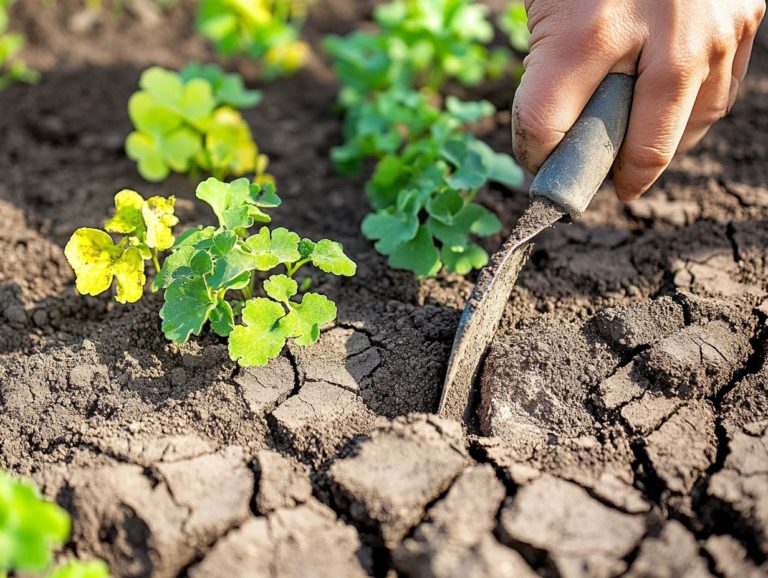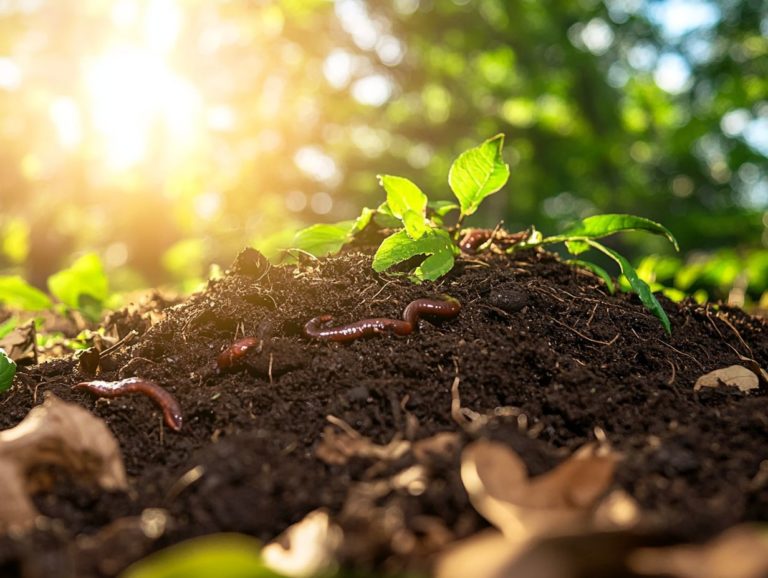The Role of Microorganisms in Soil Health
Soil health is paramount for thriving ecosystems and robust plant growth, yet it often remains overlooked in conversations about environmental sustainability.
Beneath your feet lies a vibrant realm of microorganisms that play a crucial role in maintaining soil vitality. From nutrient cycling to enhancing soil structure, these tiny organisms are indispensable for agricultural productivity and ecological balance.
This article delves into the intricate relationships between microorganisms and soil health, the factors that influence their activity, and practical strategies for nurturing a thriving soil ecosystem. Are you ready to discover the unseen champions of our natural world?
Contents
- Key Takeaways:
- The Importance of Soil Health
- The Role of Microorganisms in Soil
- How Microorganisms Contribute to Soil Health
- Factors Affecting Microbial Activity in Soil
- Promoting Soil Health through Microbial Management
- Frequently Asked Questions
- What are microorganisms and how do they contribute to soil health?
- How do microorganisms help with nutrient cycling in soil?
- Do microorganisms have any impact on soil structure?
- How can microorganisms improve plant growth and productivity?
- Can microorganisms help control harmful pathogens in soil?
- What are some ways to promote a healthy population of microorganisms in soil?
Key Takeaways:

- Microorganisms maintain healthy soil by contributing to nutrient cycling, soil structure, and fertility.
- Human activities affect microbial activity in soil, highlighting the need for proper management practices.
- Promoting soil health through microbial management leads to improved plant growth and overall ecosystem health.
The Importance of Soil Health
Soil health is paramount for maintaining crop fertility and embracing sustainable agricultural practices. It directly affects your soil’s capacity to deliver essential nutrients for plant growth while serving a crucial function in mitigating environmental pollutants and adapting to the challenges of climate change.
When you prioritize healthy soils, you re fostering microbial biodiversity and enriching the soil microbiome. This significantly enhances food security.
Healthy soils also bolster the resilience of ecosystems, enabling them to withstand climate fluctuations.
Effects on Plant Growth and Ecosystems
The influence of soil health on plant growth is undeniably significant, as it dictates nutrient availability and the overall vitality of the ecosystem, which in turn affects food security.
Healthy soil nurtures diverse microbial communities that break down organic matter and facilitate nutrient uptake in plants. This rich microbial biodiversity not only enhances nutrient acquisition but also serves as a natural defense mechanism, helping to suppress soil-borne diseases that could otherwise devastate crops.
Consider how vegetables like carrots and leafy greens flourish in rich, well-balanced soils where microorganisms actively participate in nutrient cycling. Similarly, cereals and legumes thrive thanks to robust bacterial populations that promote their growth.
Therefore, prioritizing the maintenance of these critical soil ecosystems is crucial not just for maximizing crop yield but also for supporting agricultural practices that can endure environmental challenges.
The Role of Microorganisms in Soil
Microorganisms are essential to soil health, driving crucial processes such as nutrient cycling, nitrogen fixation, and the decomposition of organic matter. Their contributions significantly enhance microbial activity and bolster overall soil fertility.
Within this intricate ecosystem, diverse microbial populations comprising both gram-negative and gram-positive bacteria each occupy unique ecological niches, working harmoniously to maintain the delicate balance of the soil environment.
Types of Microorganisms in Soil
In the intricate world of soil, a diverse array of microorganisms resides, including both gram-positive and gram-negative bacteria, collectively known as probiotic microbes. These tiny powerhouses play a crucial role in the health and functionality of soil.
You can categorize these microorganisms into several groups:
- Bacteria
- Fungi
- Actinomycetes
- Protozoa
- Viruses
Each group serves a unique purpose within the ecosystem. For example, bacteria are critical for nutrient cycling. They break down organic matter and release essential nutrients back into the soil.
Fungi create helpful relationships with plant roots, significantly enhancing nutrient uptake.
Actinomycetes are key players in decomposing organic materials and producing antibiotics that fend off harmful pathogens. Protozoa help regulate bacterial populations and further decompose organic matter. Meanwhile, soil viruses shape microbial diversity and abundance.
Together, these varied microbial populations not only enrich soil fertility but also foster healthier plant growth. This creates a vibrant environment for both agriculture and natural ecosystems.
Functions and Interactions

The functions and interactions of microorganisms in soil are essential for maintaining soil health. They facilitate nutrient cycling and boost microbial activity, both crucial for effective soil functions.
These tiny powerhouses play a significant role in processes like decomposition. They break down organic matter into simpler compounds and release essential nutrients back into the soil.
Take, for instance, the collaboration between bacteria and fungi. Together, they decompose plant residues, enriching the soil with vital elements such as phosphorus and potassium.
Certain microorganisms, like Rhizobium, form beneficial partnerships with leguminous plants. They help convert atmospheric nitrogen into a form that plants can actually use a process known as nitrogen fixation.
Beyond these critical roles, microbial communities also produce enzymes that enhance nutrient availability. This ensures plants have access to the resources they need for vigorous growth.
Healthy microbial communities are essential for sustainable agriculture. They ensure our soils thrive!
How Microorganisms Contribute to Soil Health
Microorganisms play a vital role in maintaining soil health through several essential functions. They facilitate nutrient cycling, enhance soil structure, and promote biological products that enrich soil fertility. Understanding the role of soil microorganisms in gardening highlights how all these factors foster a thriving environment for plant growth and effective disease suppression.
Their ability to break down organic matter is fundamental. This sustains soil ecosystems and ensures the long-term productivity of agricultural lands.
Nutrient Cycling
Nutrient cycling is a fundamental process driven by microorganisms. This process enhances soil health and ensures the availability of essential nutrients for plant growth.
Engaging with this intricate process involves several stages, including decomposition, mineralization, and immobilization. A diverse array of microorganisms such as bacteria, fungi, and protozoa take center stage here.
For example, decomposers do the heavy lifting by breaking down complex organic materials like leaf litter. They release nutrients back into the soil in forms that plants can readily absorb.
By effectively managing nutrient cycling, you boost soil fertility and elevate crop yields. Healthy soils, bustling with active microbial communities, foster a balanced ecosystem that promotes overall plant health and resilience against pests and diseases.
Therefore, adopting sustainable agricultural practices that nurture nutrient cycling is essential for securing long-term food sustainability.
Soil Structure and Fertility
Soil structure and fertility are profoundly shaped by the activity of microorganisms. These tiny powerhouses break down organic matter and create stable soil aggregates. This process significantly enhances nutrient acquisition.
These microorganisms transform complex organic materials into simpler forms that crops can easily absorb. A vibrant microbial community improves soil porosity and water retention and facilitates the way nutrients move and are used in the soil, supporting robust plant growth.
Act now to enrich your soil by incorporating amendments like organic manure. This will replenish vital nutrients and promote a balanced pH level. This holistic approach boosts soil fertility and enhances the resilience of your agricultural practices, ensuring sustainable productivity while championing environmental health.
Factors Affecting Microbial Activity in Soil
Numerous factors influence microbial activity in soil. These include environmental conditions such as temperature, moisture, and pH. Human activities, like farming and using chemicals, can change soil properties and affect microbial populations.
Understanding these dynamics is essential for maintaining healthy soil ecosystems.
Environmental Conditions

Environmental conditions think temperature, moisture levels, and soil properties play a pivotal role in shaping microbial activity. This, in turn, influences the overall health and productivity of soil ecosystems, particularly in the face of climate change.
These factors are critical in determining the composition and function of microbial communities. Seasonal variations can lead to shifts in populations and activity levels. For example, warmer temperatures generally boost microbial metabolism, while the moisture content of the soil dictates the availability of essential nutrients for these organisms to flourish.
Extended droughts can significantly diminish microbial diversity, ultimately harming soil health. The ongoing climate crisis intensifies these challenges, placing additional stress on existing microbial ecosystems and potentially disrupting their ability to sustain soil fertility and resilience against environmental changes.
Human Impact
Your impact on soil health often stems from agricultural practices that include using chemical fertilizers and agrochemicals. While these substances may give a quick boost in crop yields, they can seriously disrupt the microbial communities vital for maintaining overall soil health.
These chemicals can throw the delicate ecosystem of soil microorganisms out of balance. This compromises nutrient cycling and soil structure. When these essential microbial populations are disturbed, the soil struggles to retain moisture and support healthy plant growth, ultimately jeopardizing food production and ecosystem sustainability.
To counteract these adverse effects, many farmers are turning to sustainable agricultural methods like crop rotation, cover cropping, and reduced tillage. These practices foster biodiversity and strengthen soil resilience, ensuring that microbial communities can thrive for generations to come.
Promoting Soil Health through Microbial Management
Promoting soil health through effective microbial management requires you to implement a range of practices that enhance microbial activity and biodiversity.
By doing so, you contribute to sustainable agriculture and leverage biological products, ultimately improving soil fertility. What steps are you taking today to improve your soil health?
Practices for Enhancing Microbial Activity
Enhancing microbial activity in your soil can be achieved through several effective practices, such as applying organic manure, rotating crops, and employing intercropping techniques. Each of these strategies contributes positively to both soil health and fertility.
By incorporating organic materials like compost or green manures, you can significantly boost the populations of beneficial microorganisms. For example, rotating crops not only diversifies the soil composition but also disrupts pest cycles, creating an environment where specific microbes can thrive.
Intercropping with nitrogen-fixing legumes, such as clover or peas, further enriches your soil with essential nutrients while simultaneously enhancing microbial diversity. These practices dramatically improve soil structure and nutrient availability, resulting in higher crop yields and a more resilient ecosystem. This practice promotes environmental sustainability and reduces dependence on synthetic fertilizers.
Frequently Asked Questions
What are microorganisms and how do they contribute to soil health?

Microorganisms are microscopic living organisms found in soil. They include bacteria, fungi, protozoa, and nematodes. These microorganisms play a crucial role in maintaining soil health by breaking down organic matter, cycling nutrients, and controlling harmful pathogens.
How do microorganisms help with nutrient cycling in soil?
Microorganisms play a vital role in nutrient cycling by breaking down organic matter and releasing essential nutrients, such as nitrogen, phosphorus, and potassium, into the soil. This process, known as mineralization, breaks down organic matter to release nutrients, making these nutrients available for plants to absorb and use for growth.
Do microorganisms have any impact on soil structure?
Yes, microorganisms can significantly impact soil structure. Certain microorganisms, like fungi, support plants through mutual relationships by creating networks of hyphae that can improve soil structure and increase water and nutrient retention. This helps create a more stable and healthy soil environment for plants to grow.
How can microorganisms improve plant growth and productivity?
Microorganisms play a critical role in maintaining soil health, which directly affects plant growth and productivity. By breaking down organic matter and cycling nutrients, microorganisms provide essential nutrients for plants. They also contribute to soil structure, allowing for better root growth and water retention, ultimately leading to healthier and more productive plants.
Can microorganisms help control harmful pathogens in soil?
Yes, certain microorganisms can control harmful pathogens in soil. For example, some bacteria and fungi suppress diseases by competing for resources or producing toxins that inhibit the growth of pathogens. This natural form of disease control helps maintain a healthy balance of microorganisms in the soil and prevents the spread of harmful diseases.
What are some ways to promote a healthy population of microorganisms in soil?
To promote a healthy population of microorganisms in soil, it is essential to maintain a balanced and diverse ecosystem. This can be achieved through practices such as adding organic matter, reducing tillage, and avoiding the overuse of chemical fertilizers and pesticides. These practices provide a favorable environment for microorganisms to thrive and contribute to the overall health of the soil.






